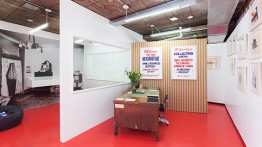Designer and Curator Prem Krishnamurthy on "Double Agency"
Monday, March 31, 2014, 7 - 8:30pm

'Process 01: Joy,' exhibition view. Photo by Naho Kubota courtesy P!
Double Agency
A free, public lecture by Prem Krishnamurthy as part of the Interdisciplinary Seminar of the School of Art
Curating and design share related goals, means, and challenges: the mediation of complex objects and ideas; the coordination of multiple actors and networks of production; the creation of conditions for presentation and participation. Both disciplines often serve multiple masters — artists, architects, museums, and publishers, amongst others — while also bearing responsibility to their publics. Similarly, both fields engage in an ongoing negotiation over questions of authorship. Within the situation of an exhibition, a book, or the framing of an institution, multiple voices and agencies overlap; in the best cases, something unexpected emerges.
Prem Krishnamurthy is a New York-based designer and curator. As a founding principal of award-winning design studio Project Projects, he has collaborated with clients including the Art Institute of Chicago, Bard Center for Curatorial Studies, Field Operations, Guggenheim Museum, Harvard University, Istanbul Design Biennial, M+ Museum, MoMA, RISD Museum, SALT, Steven Holl Architects, Vera List Center for Art & Politics, Whitney Museum, and Yale University Art Gallery, as well as artists such as Julie Ault, Judith Barry, Omer Fast, Jesper Just, Adam Pendleton, and Amie Siegel. Project Projects is a two-time finalist for the Cooper Hewitt National Design Museum’s National Design Awards. Prem is also the founding director/curator of P!, a multidisciplinary exhibition space in New York City’s Chinatown. Positioned between a commercial gallery and a “Mom-and-Pop-Kunsthalle,” P!’s exhibitions with Åbäke, Mel Bochner, Katarina Burin, Oliver Laric, Margaret Lee, Karel Martens, Brian O’Doherty, Sarah Oppenheimer, Société Réaliste, Kit Yi Wong, and others have been covered by publications including Artforum, Frieze, Art in America, Design Observer, The New York Times, The New Yorker, and The Wall Street Journal. He has edited books such as MATRIX / Berkeley: A Changing Exhibition of Contemporary Art (with Elizabeth Thomas) and Speculation, Now: Essays and Artworks (with Vyjayanthi Rao and Carin Kuoni, forthcoming). Prem is the Associate Editor of the art journal Paper Monument and serves on the Board of Directors of the online magazine Triple Canopy. His occasional live program, "Perchance: A Talkshow of P’s" premiered in Fall / Winter 2013 at Storefront for Art and Architecture, New York.
The Interdisciplinary Seminar was created as a discussion series on artistic practice for the students of the Cooper Union School of Art and the creative community that surrounds them. Lectures are free and open to the public.
The Interdisciplinary Seminar is part of the Robert Lehman Visiting Artist Program at The Cooper Union. We are grateful for major funding support from the Robert Lehman Foundation.
Located in the Frederick P. Rose Auditorium, at 41 Cooper Square (on Third Avenue between 6th and 7th Streets)




